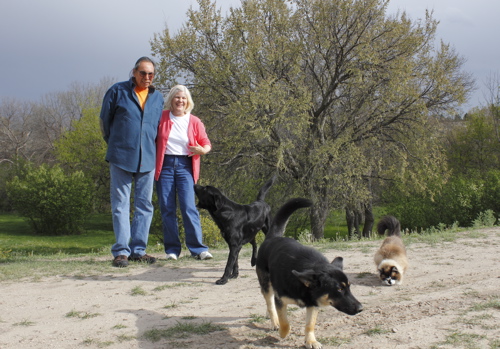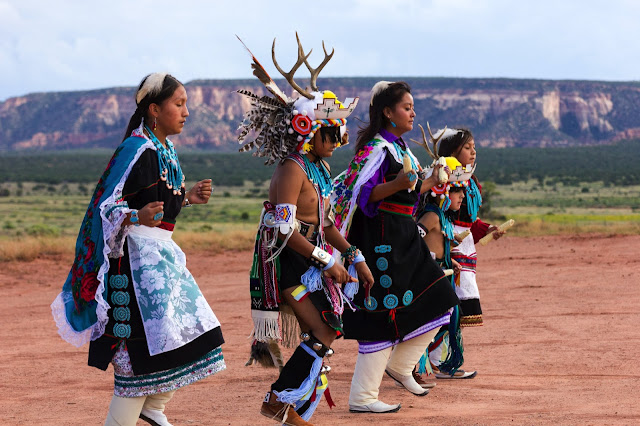“Thick Dark Fog” Wins Black Hills Film Festival Award
Published in Indian Country Today in 2012. For more on topics like this, see my book, American Apartheid: The Native American Struggle....

“During the audience discussion after The Thick Dark Fog, we hardly finished answering one question before someone would break in with another,” said Walter Littlemoon, Lakota, shown above with his wife, Jane Ridgway. “People said, ‘I just didn’t know. I heard the horror stories, but I couldn’t believe them until I saw this movie.’”
Littlemoon and Ridgway had just returned home
to the Pine Ridge Indian Reservation after a screening at the Black Hills Film
Festival of the documentary: the story of Littlemoon’s recovery from
the debilitating effects of the abusive boarding schools he attended as a child. “After the Q-and-A, people just swarmed us,” said Ridgway,
who also appears onscreen in the film.
Director Randy Vasquez based the one-hour movie on
Littlemoon’s memoir, They Called Me
Uncivilized: The Memoir of an Everyday Lakota Man from
Wounded Knee (iUniverse, 2009), a collaboration with Ridgway. Both book and movie describe the devastating legacy of psychological
trauma, cultural disruption, language loss and social woes left by the
government- or church-run institutions, which Native children were required to
attend from the late 1800s to the 1970s.
Seven years in the making and funded by Native
American Public Telecommunications (NAPT),
among others, The Thick Dark Fog won the
People’s Choice Award at the Black Hills festival—its second honor. The movie’s
first accolade was Best Documentary at the 2011 American Indian Film Festival
in San Francisco. The film’s uplifting thought—that one can heal from this and
other traumatic childhood experiences—inspired the audience, according to the
director. “There was hope,” said Vasquez, who is known for a compelling 2002
documentary about a Salvadoran activist, Testimony: The Maria
Guardado Story, and as an actor in
popular television series and feature films.
In the months ahead, The Thick Dark Fog will appear at more
festivals and venues and after June 9 will be shown on PBS. To find out when
it’ll be shown in your area, contact your local public television station. It is also
available on DVD from NAPT (www.nativetelecom.org/).
Littlemoon noted that The Thick Dark Fog communicated so well because it relates personal
experiences, so has the ring of truth: “Now people can fully understand.” In
contrast, he said, much other material on boarding schools has been produced by
authors he dubbed “parrots”: social scientists and historians working from official
documentation of the institutions.
Winning the audience award was especially meaningful to
Vasquez, who credited this success to the presence of several members of the
film’s team. At the screening, he, Littlemoon and Ridgway were joined by
producer Jonathan Skurnik, as well as Lakota participants Philomena Lakota and
Chris Eagle Hawk, who had related their own boarding-school experiences
onscreen, and child actor Manuel Yellow Horse Jr., who played the young Walter.
The team wanted the film not just to educate the
broader public but also to be used in healing the Native community, according
to Vasquez. Several audience members saw that possibility immediately,
including a resident of Pine Ridge border town, Oelrichs, South Dakota, who asked
about showing the documentary to a mixed white-and-Native Alcoholics Anonymous
group. “My first reaction was that Native people seeing The Thick Dark Fog would be overwhelmed by terrible memories and should
have a support system to help them through this,” Ridgway recalled. “The woman
reassured us that AA does provide this kind of support. So, in fact, it was a
great idea.”
Littlemoon and Ridgway were deeply affected by the
presence in the audience of his Veteran’s Administration doctor, who set him on
the path to healing years ago. The journey eventually led to a Harvard
Medical School psychological-trauma expert, Jamie Shorin,
who told Littlemoon he was suffering not from the more common Post Traumatic
Stress Disorder, but from the less-well-understood Complex Post Traumatic
Stress, which arises from childhood ordeals. Once Littlemoon’s fear had a name,
he could fight it and win, he said in the documentary.
“Walter’s
doctor cried through the whole thing,” said Ridgway. “He had guided Walter on
this journey, as well as through several serious illnesses. It was very
emotional.”
Said Vasquez: “We felt the love for the film and its
message.”
Text c. Stephanie Woodard; photograph c. Joseph Zummo.
Text c. Stephanie Woodard; photograph c. Joseph Zummo.

